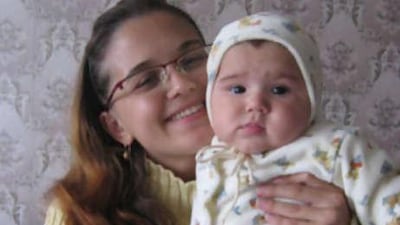MOSCOW // In the end it was just two little dots that cost Tatyana Tetyorkina her Russian citizenship. Ms Tetyorkina, 24, a resident of the industrial city of Perm, recently found herself locked in a Kafkaesque bureaucratic ordeal that all began with an error in her passport. The tale centres around the peculiar Russian letter "ë". It is pronounced "yo" and is the second vowel of Ms Tetyorkina's surname.
It is the two dots that distinguish the letter from "e", which in Russian is pronounced "ye". As most Russians can differentiate a "ye" from a "yo" without the help of the dots, the letter is rarely printed in newspapers and books. However, it is a much more formidable task for foreign language students When Ms Tetyorkina went to get a passport eight years ago from the interior ministry she was told that the clerk's computer keyboard did not have the letter. She gave little thought to the fact that the bureaucrat simply used an "e" instead. In legal terms this made her last name Tetyerkina instead of Tetyorkina. When her passport was renewed in 2004, a clerk repeated the spelling mistake, explained Ms Tetyorkina from Perm, about 1,300km east of Moscow. Ms Tetyorkina may have continued to live in blissful ignorance of the discrepancy between the name on her passport and the name on her birth certificate had she not given birth to a son, Yegor, in April. When registering her son, she insisted his name be spelt with the "ë" but the local registry office refused because of the spelling on her passport. They told her to take her case to the Perm regional branch of Russia's Federal Migration Service where she could get a new passport issued. Ms Tetyorkina's visit to migration officials, however, proved to be less than fruitful. They questioned her whereabouts in 1992 when Russia's law on citizenship came into effect, she said. At that time Ms Tetyorkina had in fact been with her mother in the former Soviet republic of Tajikistan. On learning of this, migration officials demanded proof of her Russian citizenship, she said. Ms Tetyorkina said she was unable to do this to their satisfaction. On July 2, the officials seized her passport and declared her a non-citizen. She went to local prosecutors, who ruled that the migration officials had exceeded their authority. On July 10, the local migration service branch acquiesced and issued her a new passport with the correct spelling of her surname.
The young mother, however, refused to accept it. She said this would have been effectively admitting that she became a Russian citizen only on the day the new passport was issued. This, her lawyers are arguing, could cost her welfare benefits because it means she was a non-citizen for the past 16 years. "They are trying to say my daughter and my grandson did not even exist," Ms Tetyorkina's mother, Nina Tetyorkina, said. Natalya Matrunchik, head of the passport department at the Perm regional branch of Russia's Federal Migration Service, told the Russian news portal Strana.ru that Ms Tetyorkina was at fault because she did not fill out the proper documents to establish her citizenship. "Tatyana did not want to do that," Ms Matrunchik told Strana.ru. "She felt she was a Russian citizen without any certification whatsoever." The case has caused a furore in the Russian media as an example of tyrannical bureaucracy. While Vladimir Putin successfully quashed public dissent and criticism of the Kremlin during his eight years as president - lashing out at abuses of bureaucrats is an acceptable component of the political discourse in state-controlled Russian media. Mr Putin, now Russia's powerful prime minister, even scorned the widespread corruption among bureaucrats in his 2005 address to the nation. Under Mr Putin, however, Russian bureaucracy actually ballooned, with the number of government employees growing from 1.14 million to 1.57m between 2001 and 2006, according to figures from Russia's State Statistics Service. On August 22, the Industrial District Court in Perm ruled in favour of Ms Tetyorkina in a legal action she filed asking that the immigration officials' actions be deemed illegal. She believes she was only able to successfully battle the bureaucracy thanks to support from a Russian public that sympathised with her because of her newborn son. "You wonder what the fate of most people would be," Ms Tetyorkina said. "I got lucky because of my baby." Now there is the issue of compensatory damages. "I'm going to file another legal action," she said. cshreck@thenational.ae

